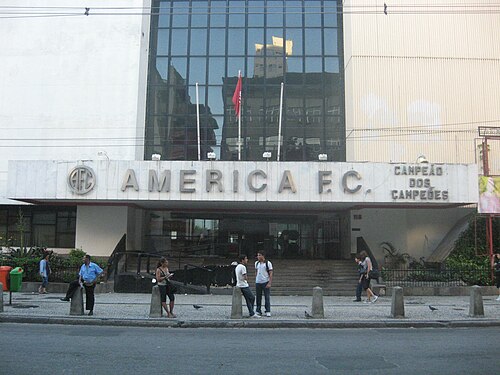 | ||||
| Full name | America Football Club | |||
|---|---|---|---|---|
| Nicknames | AFC Mecão Diabo (Devil) Rubro Carioca (Rio's Reds) Sangue (Blood) | |||
| Founded | 18 September 1904; 121 years ago (1904-09-18) | |||
| Ground | Estádio Giulite Coutinho | |||
| Capacity | 13,544 | |||
| President | Romário | |||
| Head coach | Leandrão | |||
| League | Campeonato Carioca Série A2 | |||
| 2024 | Carioca Série A2 | |||
| Website | www | |||





America Football Club, usually abbreviated toAmerica-RJ or simplyAmerica, is aBrazilian football team based in the city ofRio de Janeiro, in the northern neighborhood ofTijuca. The team competes inCampeonato Carioca Série A2, the second tier of theRio de Janeirostate football league.
Founded on 18 September 1904, the club competed in theCampeonato Brasileiro Série A several times, winning thestate championship seven times. The club's home stadium is theEstádio Giulite Coutinho, which has a capacity of 16,000. They play in red shirts, white shorts and red socks.
The football anthem composerLamartine Babo was a supporter of America.[1] America's mascot is a devil. America also sponsors a beach American football team, theAmerica Red Lions.[2]
On 18 September 1904, Alberto Koltzbucher, Alfredo Guilherme Koehler, Alfredo Mohrsted, Gustavo Bruno Mohrsted, Henrique Mohrsted, Jayme Faria Machado and Oswaldo Mohrsted founded America Football Club.[3] In 1905, America, together withBangu,Botafogo,Petrópolis,Fluminense andFutebol Atlético Clube founded Liga de Football do Rio de Janeiro (Rio de Janeiro Football League), which was the first football federation of Rio de Janeiro.[3] In 1913, the club won thestate championship for the first time.[4]
For the1971 season, the club competed in thenational Championship'sfirst edition, finishing in 11th place.[5]
The yellow star just above their emblem represents their win in theTournament of the Champions (Torneio dos Campeões) in 1982, which was a tournament organized byCBF to serve as a preview to theCampeonato Brasileiro Série A tournament.Flamengo declined the invitation so America, the team with the best record after the selected teams, was invited to fill the spot. America won the tournament by beatingGuarani in overtime atMaracanã stadium.[6]
In 2006, America was the runner-up ofTaça Guanabara. America played the final againstBotafogo.[7]
In 2008, America suffered a major blow by being relegated to theSecond Division of theCampeonato Carioca. However, they won the Second Division in 2009, thus being promoted to the first level in 2010.[8] However, the club was relegated again in 2011 and wouldn't return to the top flight until 2015.[9] The team has since been ayo-yo club[10] and, as of 2024, is in the second tier of Rio de Janeiro football.[11]
| National | ||
|---|---|---|
| Competitions | Titles | Seasons |
| Torneio dos Campeões | 1 | 1982 |
| State | ||
| Competitions | Titles | Seasons |
| Campeonato Carioca | 7 | 1913,1916,1922,1928,1931,1935,1960 |
| Campeonato Carioca Série A2 | 3 | 2009,2015,2018 |
According to theCBF register.[1]

Note: Flags indicate national team as defined underFIFA eligibility rules; some limited exceptions apply. Players may hold more than one non-FIFA nationality.
|
One controversial aspect of the club is the official mascot: the Diabo (devil), depicted as a red demon complete with horns, pointy beard, curled moustache, a long fat arrow-pointed tail, hooved feet and a black cape. The club's old stadium was nicknamedCaldeirão do Diabo ("Devil's Cauldron"). In 2006 some of the club's fans, supported by then-managerJorginho who is anEvangelical Christian, attempted to replace the diabo with abald eagle, claiming that the devil was "unlucky". However, as the "diabo" is a traditional part of the club's story and with the original mascot the club conquered its greatest achievements and there was no change in the club's fortunes with the new mascot, the replacement was abandoned and it was considered that Jorginho's opinion was motivated by "religious fanaticism".[12]
America is the Brazilian club with the largest number of other clubs named after it. It has homonyms inNatal,São José do Rio Preto,Três Rios,Manaus,Teófilo Otoni andFortaleza.[13]